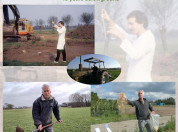Search
28 search results
Search results
-
National Growth Fund finances Dutch Holomicrobiome Institute
The government of the Netherlands has allocated €200 million from the country’s National Growth Fund for a public-private consortium that will conduct research into 'microbiomes' and economically interesting applications thereof. In the consortium, NIOO is partnering with ten Dutch universities, five university-medical centres, four universities of applied sciences, many other knowledge organisations and together with dozens of small and large companies and societal organisations.
-
From Pioneer to Soil Prophet: 40 years belowground - Farewell symposium Wietse de Boer
On Thursday April 4 we'll have the Farewell Symposium and reception for our long-time colleague Prof. Dr Wietse de Boer (Department of Microbial Ecology at NIOO and Wageningen University).
-
Restoring and rewilding ecosystems
It is a topical issue and has long been a research interest of NIOO: how do you restore nature? For example, former farmland can be made more suitable for nature again, and areas connected to each other. This approach could also help to mitigate the consequences of climate change. Furthermore, a growing amount of knowledge about rewilding has become available in recent years. It has become clear that, in the long run, rewilding yields strong ecosystems with more biodiversity.
-
Postgraduate course: New frontiers in microbial ecology & climate change
In November, a five-day course on microbial ecology & climate change will be organised on Schiermonnikoog. Our colleague Eiko Kuramae from the Department of Microbial Ecology and professor at Utrecht University is one of the organisers. -
Can we train soil microbial communities to promote plant growth?
Microbial communities are vital for ecosystem functions, and utilizing their diversity, particularly in phosphate-solubilising microbial communities, can provide sustainable solutions for agriculture. However, constructing and optimizing these communities present challenges due to complex interactions among microorganisms.
-
Greenhouse gases
Climate change is amplified by greenhouse gas emissions. At NIOO, we work on the fundamental understanding of how gases such as methane, carbon dioxide and nitrogen dioxide influence ecosystems. Our knowledge of carbon and nitrogen cycles provides insight into the potential of greenhouse mitigation tools. In a Dutch freshwater lake or the soil of a tropical rain forest.
-
Bewick’s swans choose wintering areas based on the weather
Bewick’s swans fly less far during their autumn migration when the weather is warm. Climate change has therefore led to a shift in their common wintering areas. Now, for the first time, bird researchers have been able to use long-term GPS data to pinpoint the specific choices that individual swans make.
-
Symposium Migratory birds under pressure
On Thursday 7 September 2023 our Animal Ecology department is organising a symposium on migratory birds under pressure, followed by the PhD thesis defence of Kees Schreven the next day.
-
PhD Thesis defence Kees Schreven: range expansion in Arctic-breeding geese
On Friday 8 September 2023, our colleague Kees Schreven will defend his PhD thesis "Geese colonising New Land: causes and mechanisms of range expansion in an Arctic-breeding migrant".
-
Galápagos (4): the expedition film
An international research team led by the Netherlands Institute of Ecology (NIOO-KNAW), the University of San Francisco de Quito (USFQ) and the Galápagos Science Centre (GSC) is to search for invisible life on the Galápagos Islands. The diversity of bacteria and other microscopic organisms may not be evident to the naked eye, but it is essential to nature. The research team will uncover the yet unknown microbial world that Darwin could not see. Specific focus is given to microorganisms associated with the islands' giant daisies (Scalesia): unique endemic plants that are currently threatened by extinction.
